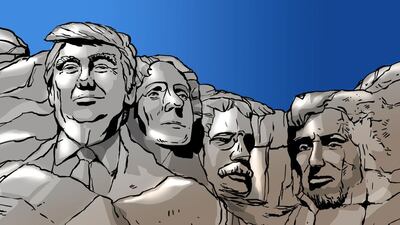Donald Trump’s election as the 45th president of the United States is a profound shock that threatens tumultuous consequences for his country and the international system as a whole. After a highly controversial campaign scarred by Mr Trump’s frequently offensive rhetoric and questionable past conduct, the new president’s first 100 days in office will be awaited with interest by all and apprehension among many.
Over the past months, Mr Trump has drummed up increasing support through his promise to “make America great again” through strengthened national security and firm measures to “restore the rule of law to our land”. The new president has promised that once he enters the White House next January, he will immediately sign a raft of executive orders repudiating much of the legacy left by the previous administration.
Mr Trump’s approach to foreign affairs will signal a new hard-headed unilateralism that will concern many US allies. Given traditional presidential prerogatives in guiding US foreign policy, the new president will have considerable latitude to unravel a range of complex multilateral agreements that underpinned US foreign relations in the Obama era.
Mr Trump has pledged to secure a US withdrawal from or renegotiation of the North American Free Trade Agreement (Nafta), abandon the Trans Pacific Partnership trade deal, and has threatened to reconsider US commitments to Nato if the alliance’s European members do not make greater financial and military contributions. Mr Trump has strongly opposed the Iran nuclear deal on the basis that Tehran “outsmarted” Barack Obama and the state department. Although his stated plan of renegotiating the agreement has not so far been fleshed out, he has pledged stronger action to counter Iranian interference in the Middle East.
This new emphasis on an “America first” foreign policy reflects Mr Trump’s inclination to see diplomacy in terms of securing “transactional” agreements rather than working to uphold vague principles. This approach is likely to shape the new administration’s relations with China and Russia. Though the new president has previously criticised China for dumping exports on world markets, bilateral relations between Washington and Beijing will probably focus on a renewed trading relationship. To the discomfort of many, Mr Trump has praised Vladimir Putin as a strong leader with whom he believes he can work effectively.
In terms of domestic policy, Mr Trump has pledged to repeal the “ObamaCare” health reforms, simplify the tax code, and roll back clean energy legislation. Citing alleged corruption in Congress and the federal government, Mr Trump has also promised to “drain the swamp” by imposing term limits on all members of Congress, a federal hiring freeze, and a five-year ban preventing former White House and congressional staff from working as lobbyists.
Mr Trump will also seek to make good on pledges to restrict immigration. During his campaign, his frequently crude attacks on Mexicans and Muslims among others attracted heavy criticism, but nevertheless played well with his enthusiastic support base. He will seek a ban on immigrants from “terror-prone” regions, the immediate suspension of admissions of Syrian refugees, and a wall on the southern border with Mexico.
However, the new president’s fire-breathing offensive against his predecessor, immigrants and government corruption could well backfire given that Congressional support will be needed for all these proposed measures. Mr Trump’s belligerent approach on the campaign circuit will not serve him so well in the White House when he is faced with the intricacies of federal law making. The inbuilt separation of powers within the government could quickly lead to the system seizing up if the new president continues to antagonise institutions and opinion groups who, aghast at the election, are already determined to resist him.
Mr Trump’s nakedly partisan approach evidently suggests that a radically different tone to an office whose previous holders have traditionally been seen as elected monarchs presiding over the most powerful and robust democracy in the world. Although the new president has a healthy self-regard for his negotiating abilities, there is nothing in his record to suggest that he can manage the complexities of government or that he has sufficient emotional intelligence to conciliate those who hold differing opinions.
After being ostracised by a significant portion of the Republican Party elite during his campaign, there is little to suggest that Mr Trump can reform his political persona to the extent that he can build bridges with key figures needed to make his presidency a success.
A former British prime minister, Clement Attlee, once advised a protégé that “if you're going to negotiate with someone tomorrow, don't insult him today”. Even if Mr Trump embarks on his promised blitz of executive orders after taking office, it is very likely that the gaping schism in the US polity, in large part deliberately deepened by his own intemperate rhetoric, could ensure that White House’s next occupant will become an increasingly forlorn and lonely figure as his country is torn by continued political conflict.
Stephen Blackwell is an international politics and security analyst

